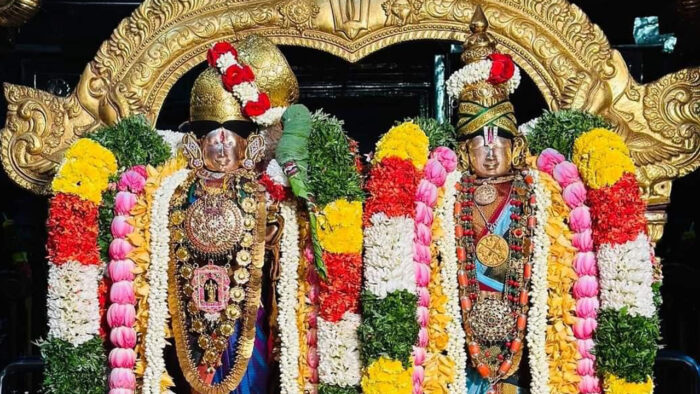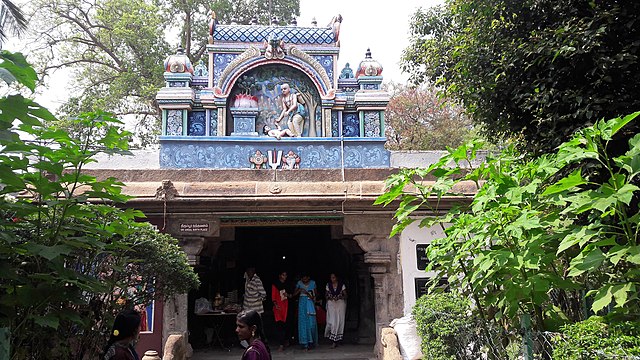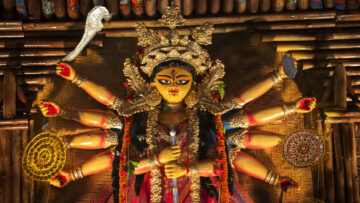The month of Margazhi, also known as DhanurmAsa, is famous in Southern India as we celebrate the entire 30 days of the month by reciting Andal’s Thiruppavai early in the morning. We hear Thiruppavai in every temple and the atmosphere itself is very divine. Lord Krishna, in the Bhagavad-Gita, says that amongst the months, he is MarghashIrsha (Margazhi). Such is the greatness of this month, and Andal’s Thiruppavai elevates it to an even holier status.
Andal, or Godha as we know her, is revered as one of the twelve Azhwars (Saint Poets) of the Srivaishnava tradition and the only female to achieve this status. She is considered as an incarnation of BhUmi Devi. She was born in Srivilliputhur and was the daughter of Periyazhwar, who is also one among the Azhwars.
(Figure 1: Credit: Wikipedia – The garden where Periyazhwar is believed to have found the baby girl who he named as Godha)
Periyazhwar found a baby girl in his garden backyard and decided to rear the child as his own and named her “Godha”. He instilled Bhakti towards the Lord in young Godha, to the extent that she desired to marry the Lord. Periyazhwar used to craft garlands for the Lord from the flowers in his garden. Young Godha, since she decided to marry the Lord, felt it appropriate to wear the garland before offering it to the Lord. The Lord, pleased with her devotion, gladly accepted the garland worn by her. Hence, she was famously called as “chUDhighkhuDhudhthachuDharkhoDhi”.
Andal had a unique desire – she wanted to marry the Lord and no one else. Curious if anyone in history had such a wish and succeeded, she discovered the Gopis in the Bhaagavatha Purana. These Gopis, aspiring to marry Lord Krishna, observed a thirty-day penance (paavainonbu) and successfully married him. Inspired by their story, Andal was determined to perform a similar penance and attain the Lord. The concept of “Insect-Bee Logic” (kīṭabhṛṅganyāyaḥ) is employed here to explain the approach she took in performing this penance.
The “Insect-Bee Logic” (kīṭabhṛṅganyāyaḥ) is a metaphorical concept. Imagine a bee (bhṛṅga) capturing an insect (kīṭa) and placing it inside a cave. The insect, surrounded by bees and hearing their humming sound all the time, lives near them, constantly thinking about them. Over time, the insect transforms into a bee.
In a similar way, Andal adopts this metaphor in her penance. She envisions herself as a Gopika, with Srivilliputhur as Brindavana. Becoming one among the Gopikas, she visits homes, wakes up the ladies, and encourages them to join her in seeking the Lord. This background explains why Godha initiated the thirty-day penance in this month, giving rise to the magnificent Dramida-Prabandam known as Thiruppavai.
Thiruppavai, composed in beautiful Tamil poetry, is typically introduced to children when they are young. There is a saying that not knowing Thiruppavai is akin to being a burden to the world, underscoring its profound importance. This composition is renowned as the “Bhagavati-gitA” (Sung by the Goddess), emphasizing the idea that Lord Narayana is our protector, and we should surrender our burdens to Him completely. It is interesting to note that the name “Narayana,” which is part of the Ashtakshara-mantra, is not used in any of the verses in Bhagavad-Gita. However, Godha introduces this name in the very first verse of Thiruppavai.
The winter season, known as hemanta-Ṛituḥ, consists of two months: Margashirshaḥ and Pauṣhaḥ. Margashirshaḥ is in Dakṣhiṇāyaṇam and is considered the BrAhma-muhurta for Devas, signifying a time when the mind is clear. It is believed that any work started during this month will be successful.
In Paduka Sahasram, a magnificent thousand-verse hymn on the Lord’s sandals by Swami Vedanta Desika, the great Acharya, poet, and philosopher of Srivaishnava tradition, Swami Desika expresses his desire to surrender completely to the Lord and his paduka. This surrender is aimed at overcoming the challenges of this world, all while the mind is clear. The essence of Thiruppavai lies in the philosophy of this complete surrender also called as ‘sharanagati’.
Swami Vedanta Desika wrote a hymn called “Godhastuti,” comprising 29 verses, mostly in the VasantaTilaka meter, praising Godha. In one of these verses, Swami Desika discusses the remarkable fortune of Andal in uniting with the Lord, achieved through her penance. This verse employs the vyAja-Stuti technique, a form of irony where criticism is subtly conveyed through praise. At first glance, it may seem as if Godha is being mocked, but in reality, the verse admirably celebrates her wise choice of a spouse. This skillful use of irony adds depth to the praise, highlighting the uniqueness and intelligence of Andal’s decision in choosing the Lord as her companion.
नागेशयस्सुतनु पक्षिरथः कथं ते
जातस्स्वयंवरपतिः पुरुषः पुराणः।
एवंविधास्समुचितं प्रणयं भवत्याः
सन्दर्शयन्ति परिहासगिरस्सखीनाम्।।
nāgeśayassutanupakṣirathaḥkathaṃte
jātassvayaṃvarapatiḥpuruṣaḥpurāṇaḥ।
evaṃvidhāssamucitaṃpraṇayaṃbhavatyāḥ
sandarśayantiparihāsagirassakhīnām।।
(Meaning – “O Godha! The bed of your beloved is a snake, his vehicle is a bird, and he is ancient, with an unknown birth date. You overlooked all these factors and chose him as your husband. This is how your friends tease you for choosing the Lord as your husband”)
Swami Desika, in his Godha Stuti, explains that Vishnuchitta, also known as Periyazhwar (Andal’s father and one of the twelve Azhwars), earned the title “Periyazhwar” (Great Azhwar) because he offered the Lord garlands that had adorned Godha. This act elevated him to the esteemed position of the Lord’s father-in-law. Despite the Lord being known as “Stutipriya” (one pleased by eulogy), and even though Vishnuchitta and other Azhwars praised and composed hymns in reverence of the Lord, none of them received a distinctive title. Vishnuchitta achieved a unique status by presenting the Lord with the garland worn by Godha, accomplishing what his verses couldn’t express. This highlights the significance of Godha’s connection and the profound impact of her devotion on her father’s relationship with the divine.
Sri Ramanujacharya, the revered Srivaishnava Acharya, is affectionately known as “Thiruppavai Jeer” due to his deep admiration for Thiruppavai. He is famously regarded as the elder brother of Andal. In another prabandam of Andal, NachiyarThirumozhi, she expresses her intention to offer 100 vessels of akkaravadisal (sweet rice dish) to the Lord – “nooruthadaniraindhaakkaravadisilsonnen.” Upon hearing this verse, Sri Ramanujacharya, unsure if Andal fulfilled her vow, offered the dish to the Lord on her behalf. He then visited Srivilliputhur to have darshan of Andal. It is believed that Andal affectionately called him “Anna,” signifying brother, as he fulfilled the wish of his younger sister.
In conclusion, even the nocturnal souls awaken early during the sacred Margazhi month to chant the verses of Andal’s Thiruppavai. Regularly reciting these hymns brings blessings of prosperity, health, wealth, and supports our spiritual journey towards attaining the Lord.
Feature Image Credit: pinterest.com
Disclaimer: The opinions expressed in this article belong to the author. Indic Today is neither responsible nor liable for the accuracy, completeness, suitability, or validity of any information in the article.










